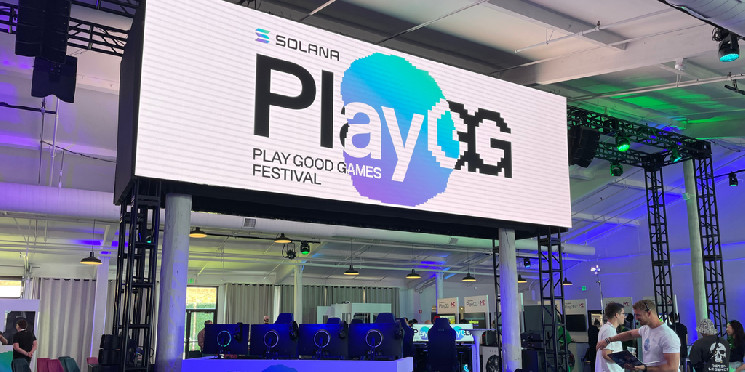While naysayers continue to call NFTs and the associated blockchain games a cash grab, the Solana Foundation intends to flip the script and change the narrative, making a public push last week with its PlayGG event in San Diego.
“The reception and the excitement from both the attendees and our developer community has been amazing,” Solana Games General Manager Johnny Lee told Decrypt at the event, which spotlighted a variety of games building on Solana.
Lee said the Solana Foundation hoped the free two-day event would entice investors, the media, and local San Diego families to experience blockchain gaming in a way that didn’t emphasize crypto or NFTs. The event included games like Star Atlas, Aurory, and Alchemy: Battle for Ankhos, and featured professional gamers from the G2 Esports team.
“By definition, we are a Web3-related event, but we don’t think of this as a Web3 event,” Lee said. “We call it PlayGG: play good games.”
Realizing that “NFT” is often a dirty word amongst members of the gaming community, many developers are distancing themselves from the term, instead calling them digital collectibles. Many of the games presented at PlayGG, unlike blockchain games of the past (like play-to-earn games), did not push NFTs or token rewards.
Many of the games, in fact, do not require any form of payment or cryptocurrency to play. Lee said that the goal for titles supported by the Solana Games initiative is not simply to be better than other blockchain games, but to stand tall even when compared to traditional (or “Web2”) titles.
Today, the two-day PlayGG event kicks off in San Diego at the Julep Venue!
Streamers, @G2esports talent, developers, and gamers have gathered to celebrate, connect, and play 50+ games built on Solana 🎮
Learn more: https://t.co/XxVvsGdtKT pic.twitter.com/zrSk5rVawF
— Solana (@solana) July 18, 2023
“We have always believed and focused on [the idea] that Web3 games need to compete with all games, not competing only with other blockchain games,” Lee said. “I think it was important to show good games as soon as possible—that we’re using blockchain technology to provide unique and quality player experiences.”
To make sure Solana Gaming only supports games that have promise, Lee said game developers have to present a build of the game first and let his team play them. Over 50 such games were present at the PlayGG event.
“When game developers would approach us for any modicum of commercial support, we required a play test,” he said, “and we announced it publicly in the industry.”
One of the main complaints that many gaming fans had of earlier “metaverse” and blockchain games was the low quality and high cost of access. Lee said that Solana Games is willing to spend the capital and time it takes to ensure that quality games are released on the Solana network.
“We were prepared to take a short-term business hit to properly build the long-term value of our games ecosystem,” Lee said.
While Lee is optimistic about the future of gaming on Solana, he acknowledged that the blockchain has had issues in the past. However, he said the network is stronger now than ever before, and claimed that it will have no problem supporting games and transactions. He also pointed to optimism around the upcoming Firedancer validator client, which may further help stabilize the network.
“While the name ‘Firedancer’ is cool, the work it’s doing is even more so,” Lee said. “Its testnet has surpassed our expectations with its performance improvements.”
While many of the games at SolanaPlayGG were still in development, Lee is confident that they could match up well against similar games from the traditional game industry when they are ready for public release.
“We can confidently say now that the far majority of our games have the potential to compete with other mainstream games in similar genres,” Lee said. “We’re very excited for this next stage of Web3 games.”



